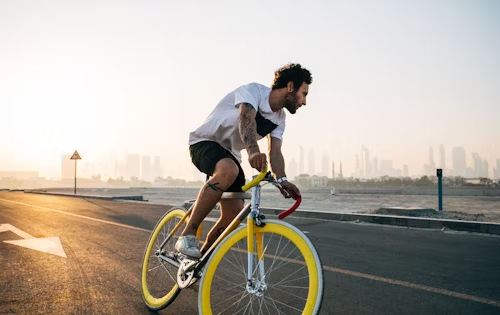The Best Training Tips for Biking
Author: D1 TrainingIf you’re like many, you’ve just wrapped up watching the Tour de France where there were valuable lessons to be learned, and inspired by, from the professionals. They showcase the pinnacle of endurance, strength, and strategy. So, whether you're an off-trail enthusiast, a BMX rider, a hobbyist, or a racer, these training tips can help you enhance your biking performance.

Photo by Jonny Kennaugh on Unsplash
Build a Solid Foundation
Your legs are the powerhouse of your biking performance. Effective leg training is essential for developing the strength and endurance needed for both short and long rides. Here are some key exercises to incorporate into your routine:
Squats: Squats are excellent for building overall leg strength. Variations such as front squats, back squats, and Bulgarian split squats can target different muscle groups.
Lunges: Lunges improve balance and stability while targeting your quadriceps, hamstrings, and glutes.
Leg Press: This machine-based exercise allows you to lift heavier weights than squats, which can help build significant leg strength.
Calf Raises: Strong calves are crucial for maintaining proper pedal stroke and preventing fatigue.
Incorporate Interval Training
Interval training involves alternating between high-intensity efforts and periods of rest or low-intensity activity. This type of training is highly effective for improving cardiovascular fitness, increasing speed, and enhancing endurance. For cyclists, it might look like this:
Sprint Intervals: Short bursts of all-out effort followed by recovery periods. For example, sprint for 30 seconds, then ride at a leisurely pace for 2 minutes. Repeat 8-10 times.
Hill Repeats: Find a challenging hill and ride up at a high intensity, then recover on the way down. Repeat 5-8 times.
Master Your Technique
Efficiency in biking is not just about strength; it's also about technique. Proper techniques can help you conserve energy and reduce the risk of injury.
Focus on:
Pedal Stroke: Aim for a smooth, circular motion rather than simply pushing down on the pedals. This ensures you're engaging all the right muscle groups.
Body Position: Maintain a relaxed, aerodynamic position on your bike. Keep your elbows slightly bent and your upper body still.
Nutrition and Hydration
Just like the pros in the Tour de France, proper nutrition and hydration are key to optimal performance.
Balanced Diet: Consume a mix of carbohydrates, proteins, and fats. Carbohydrates provide the energy needed for long rides, while proteins aid in muscle recovery.
Hydration: Drink water regularly throughout the day and during your rides. For longer rides, consider sports drinks that replenish electrolytes.
Pre-Ride Fuel: Eat a meal rich in carbohydrates and low in fat a few hours before a long ride. Bananas, oatmeal, and whole grain toast are great options.
Recovery
Recovery allows your muscles to repair and grow stronger. Without adequate recovery, you risk overtraining and injury.
Rest Days: Schedule regular rest days into your training plan. Your body needs time to heal.
Active Recovery: Engage in low-intensity activities like walking, yoga, or light cycling on rest days to promote blood flow without adding stress to your muscles.
Stretching and Foam Rolling: Stretching and foam rolling after rides can help reduce muscle tightness and improve flexibility.
Mental Toughness
Cycling, especially in races like the Tour de France, requires not just physical strength but also mental resilience. Train your mind to stay focused and positive:
Set Goals: Whether it's completing a certain distance or improving your time, having clear goals can keep you motivated.
Visualization: Picture yourself achieving your goals. This can boost your confidence and performance.
Mindfulness: Practice mindfulness techniques to stay present and manage stress during challenging rides.
By incorporating these training tips into your routine, you can improve your biking performance, whether you're hitting the trails, racing, or enjoying a leisurely ride. The pros in the Tour de France might seem superhuman, but their success comes down to disciplined training, proper technique, and smart recovery—all of which are achievable for cyclists at any level.
